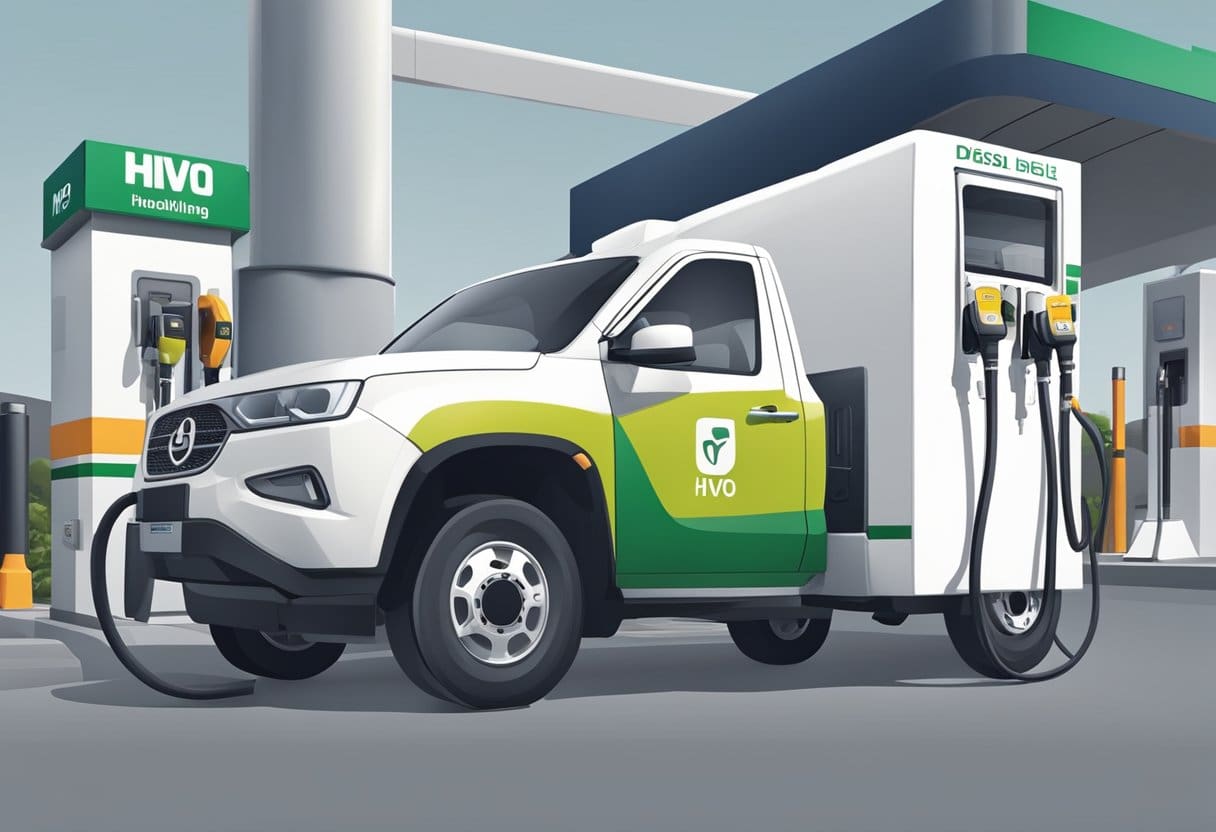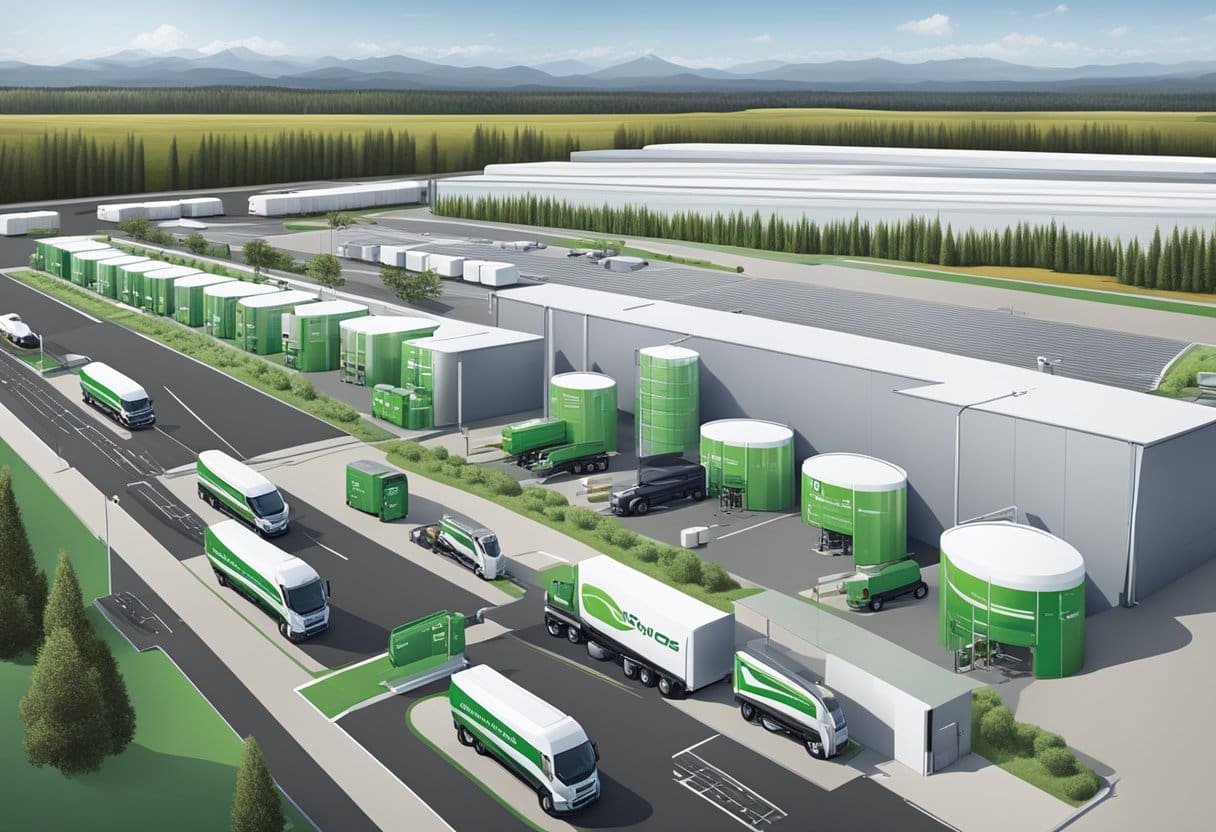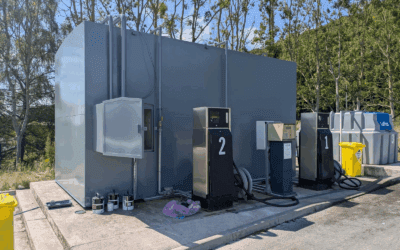With the UK Government tightening emissions standards and a push for sustainability, commercial vehicle fleets are under pressure to find fuel sources that don’t compromise performance or increase storage complexities. This is why HVO fuel is the best choice for commercial vehicles. Hydrotreated Vegetable Oil (HVO) fuel offers the ideal solution, reducing emissions significantly while seamlessly integrating with existing diesel infrastructure, including storage. HVO fuel boasts a cleaner burn, improved engine performance, and a long shelf life, making it a game-changer for ambulances, police cars, fire engines, gritters, waste collection trucks, and local government fleet operations.
Understanding HVO Fuel As The Best Choice For Commercial Vehicles

Hydrotreated Vegetable Oil (HVO) fuel is a renewable, high-quality fuel derived from vegetable oils and animal fats. Through a hydrotreatment process, HVO fuel removes contaminants and enhances its performance capabilities, yielding a fuel that outperforms traditional diesel in several ways.
Key Advantages of HVO Fuel
-
Environmental Benefits: HVO fuel offers substantial environmental advantages. Its production from renewable resources and cleaner combustion significantly reduce greenhouse gas emissions (up to 90% compared to conventional diesel). This positions HVO fuel as a key tool for fleets aiming to meet strict emissions targets without sacrificing operational efficiency.
-
Operational Advantages: HVO fuel delivers better engine performance due to its high cetane number, promoting smoother operation. Additionally, its cleaner burn reduces wear and tear, leading to potential savings in maintenance costs. It boasts exceptional cold-weather performance, making it reliable for vehicles operating in harsh conditions.
-
Compatibility with Existing Infrastructure: Perhaps HVO’s greatest appeal is its seamless integration. It can be used in existing diesel engines without modifications, and it can be stored in the same tanks as regular diesel. This compatibility simplifies the transition to HVO and makes it a practical and immediate solution for fleets across diverse sectors.
Simplifying Fuel Storage with HVO Fuel

One of the often-overlooked benefits of HVO fuel is its ease of storage. Its long shelf life (up to 10 years) and resistance to oxidation mean commercial fleets can store HVO for extended periods without degradation. This translates to less frequent fuel rotation, reduced waste, and simplified logistics, especially for fleets with seasonal vehicles.
Moreover, since HVO is compatible with existing diesel tanks, fleets can switch to HVO without significant infrastructure investments. However, to maximise storage efficiency, some minor modifications might be beneficial:
- Temperature Control: Consider installing heating and insulation systems to optimise fuel performance, especially in colder climates.
- Dedicated Tanks: If practical, dedicating specific tanks to HVO can streamline fuel management and prevent potential contamination risks.
Case Study: Scarborough Borough Council’s Success with HVO Storage

Scarborough Borough Council, featured on the Local Government Association website, provides an excellent case study for efficient HVO storage integration. Faced with the challenge of reducing their fleet emissions, the council made the strategic switch to HVO fuel. Recognising the storage advantages of HVO, they made a few key optimisations within their existing fuel infrastructure:
-
Temperature Control: The council invested in heating systems for their HVO storage tanks to maintain optimal fuel viscosity, especially crucial in the region’s colder months. This proactivity ensures consistent engine performance year-round.
-
Dedicated Storage: When feasible, the council allocated separate tanks for HVO fuel. This straightforward measure streamlines fuel delivery, simplifies management, and virtually eliminates any risk of cross-contamination.
Benefits Realised:
-
Reduced Waste: HVO’s impressive shelf life has lowered fuel wastage due to spoilage, minimizing both environmental impact and costs associated with fuel disposal.
-
Simplified Logistics: The long-term stability of HVO has enabled the council to safely store larger quantities of fuel on-site, reducing the frequency of fuel deliveries and optimising their supply chain.
-
Operational Savings: Scarborough Borough Council has reported a noticeable decline in vehicle maintenance expenses since transitioning to HVO, attributed to the fuel’s cleaner burning properties and reduced engine wear.
The Scarborough Borough Council’s success demonstrates that with minimal adjustments, organizations can reap the operational and environmental rewards HVO fuel offers while ensuring efficient and reliable fuel storage.
Reliability and Safety – Why HVO Fuel Is The Best Choice For Commercial Vehicles

HVO fuel’s consistent composition and high flashpoint make it a reliable and safe fuel for essential service vehicles. Its quality holds up over time, ensuring dependable performance for ambulances, police vehicles, and fire engines. Moreover, HVO fuel adheres to stringent safety regulations, offering peace of mind for fleet managers in both the public and private sectors.
Cost and Economic Considerations
While the initial cost of HVO fuel may be slightly higher than conventional diesel, a comprehensive evaluation reveals potential long-term savings. Reduced engine wear, improved fuel efficiency, and streamlined storage can offset the initial cost premium. Additionally, as governments enforce stricter emissions regulations, fleets using HVO may avoid potential fines and penalties associated with non-compliance. The positive public perception of adopting sustainable fuels can also offer market advantages.
Supply Chain and Availability
The supply chain for HVO fuel is expanding rapidly to meet the growing demand from sectors that rely heavily on commercial vehicles. Fuel suppliers are increasingly making HVO fuel available, and distribution networks are adapting accordingly. While some challenges in ensuring consistent supply remain, the industry is actively working towards greater scalability and accessibility. This availability in comparison with other fuel sources and vehicle types make HVO fuel the best choice for commercial vehicles.
Path to Net-Zero Emissions
As organizations strive for carbon neutrality, HVO fuel plays a pivotal role. With its significantly lower carbon footprint, HVO is well-aligned with net-zero emissions targets. Moreover, Original Equipment Manufacturers (OEMs) are increasingly supporting the use of HVO fuel in their vehicles, ensuring that new commercial fleets are well-positioned to take advantage of this sustainable fuel option.
Conclusion

In the pursuit of sustainable solutions for commercial vehicle fleets, HVO fuel stands out as a clear frontrunner. Its unmatched reduction in greenhouse gas emissions, seamless integration with existing engines and infrastructure, and exceptional storage characteristics make it a highly practical and environmentally conscious choice, and the best choice for commercial vehicles.
As municipalities and commercial operators strive towards net-zero goals and seek ways to optimise their operations, HVO fuel presents an immediate and effective opportunity. The benefits extend beyond environmental responsibility, with the potential to lower maintenance costs, improve engine performance, and simplify fuel logistics.
The increasing availability of HVO fuel, along with its growing acceptance among OEMs, further strengthens its position as the fuel of the future. Organisations and governments ready to join the transition will not only pave the way for a cleaner tomorrow but also likely reap long-term economic and operational benefits.
Frequently Asked Questions
What exactly is HVO fuel, and how is it different from regular diesel?
HVO (Hydrotreated Vegetable Oil) fuel is a renewable diesel fuel produced from waste materials like used cooking oil and animal fats. Unlike traditional diesel, it goes through a hydrotreatment process that removes impurities and results in a cleaner-burning, high-performance fuel.
Can I use HVO fuel in my existing diesel vehicle?
Yes! One of the biggest advantages of HVO fuel is that it can be used in existing diesel engines without any modifications. You can even mix it with regular diesel in any proportion.
How does HVO fuel impact engine performance?
HVO fuel typically improves engine performance thanks to its high cetane number. This translates to smoother engine operation, potentially increased fuel efficiency, and reduced wear and tear over time.
Are there any special storage requirements for HVO fuel?
HVO fuel offers excellent storage characteristics. It can be stored in existing diesel tanks, and its long shelf life (up to 10 years) reduces the need for frequent fuel rotation. However, temperature control measures are recommended for optimal performance, especially in colder climates.
Is HVO fuel more expensive than regular diesel?
Currently, HVO fuel may have a slightly higher upfront cost than traditional diesel. However, considering its potential for reducing maintenance, improving efficiency, and its long-term environmental benefits, HVO fuel can prove a cost-effective fuel solution for many fleets.
How does HVO fuel compare to biodiesel?
Both HVO fuel and biodiesel are renewable fuels with lower emissions than conventional diesel. However, HVO fuel boasts superior storage stability, better cold weather performance, and greater compatibility with existing diesel engines and infrastructure.








